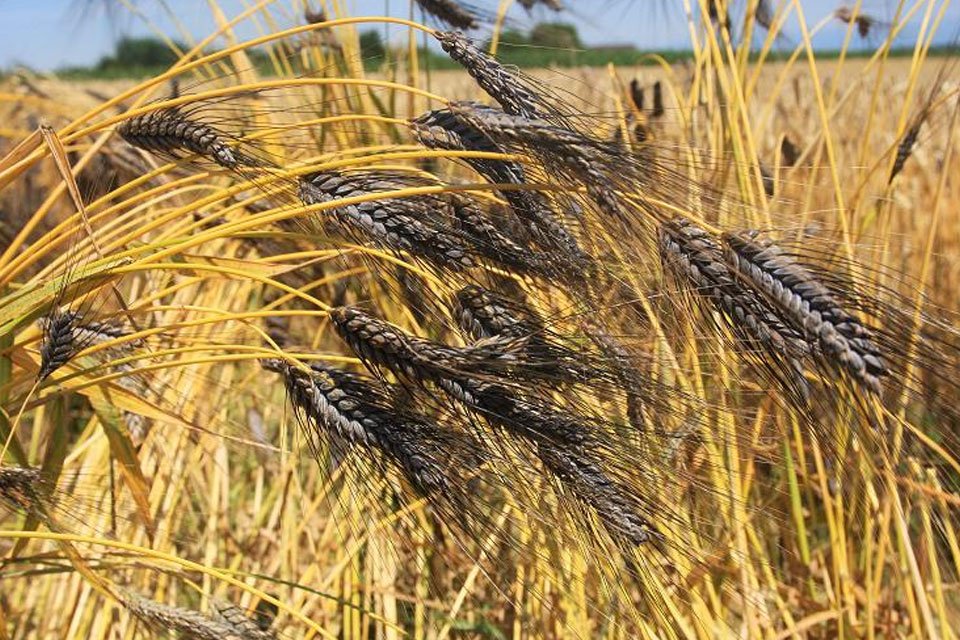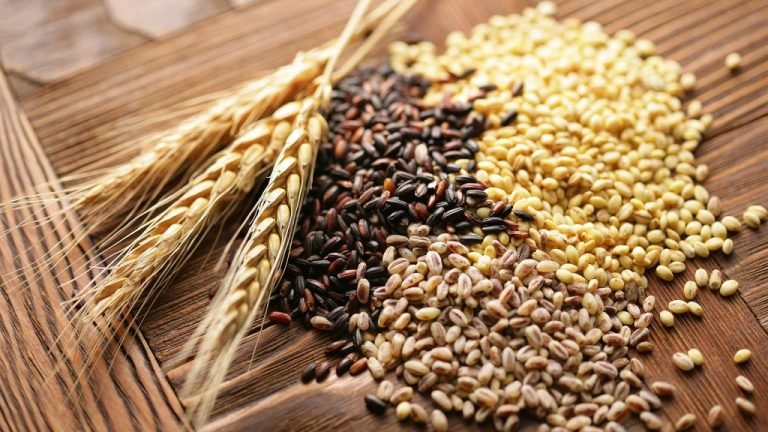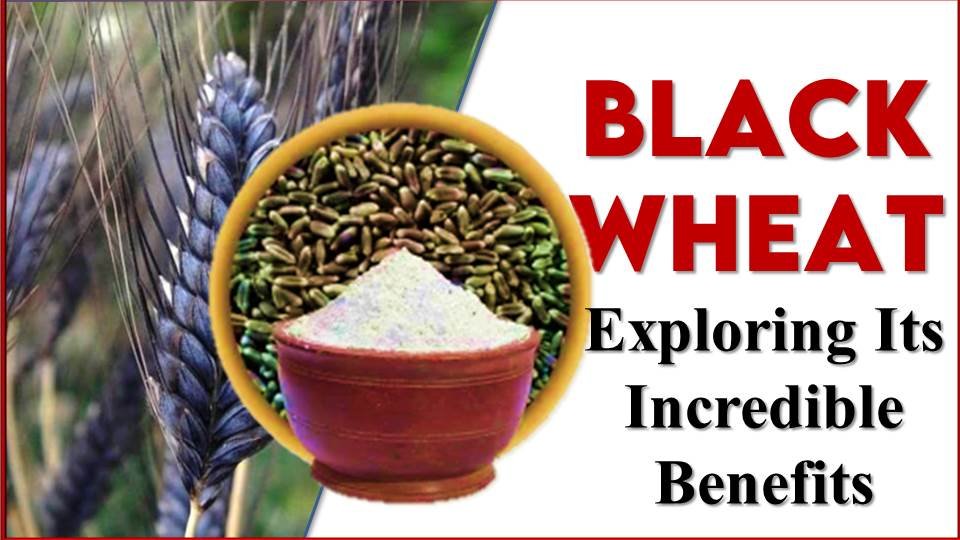What is Black Wheat?- Are you considering incorporating a nutritious high-fiber alternative grain into your diet? With so many fitness and health trends out there, it’s difficult to know what’s best for your body. One food that has recently gained popularity amongst health-conscious individuals is Black wheat, a highly nutritious and versatile grain that may be worth a try!
In this blog post, we’ll take a closer look at the benefits of black wheat and discover the many reasons why it is a super food for your health and well-being. Does black wheat contain gluten? – We will know the answer also.
What is black wheat?
What is Black Wheat? Here is your answer. Black wheat is a pigmented variety of wheat, rich in antioxidants and dietary fiber with a lower glycemic index compared to traditional wheat varieties. In India, Black wheat was developed by scientists at NABI- National Agro-Food Biotechnology Institute, Mohali Punjab after 7 years of research.
Black wheat also known as Kala Gehu, has the potential to be a game-changer for the wheat industry in India. The NABI team developed Kala Gehu to increase the intake of anthocyanin compound which prevents the formation of free radicals in human body. Anthocyanins are a type of plant pigment that are responsible for red, purple, and blue colors in many fruits, vegetables, and flowers. Including foods that contain high amounts of anthocyanin, such as black wheat, in your daily diet can help promote overall health and reduce the risk of chronic diseases.

Read More:
- How makhana is made | Latest Makhana farming in India
- One Nation One Fertilizer Scheme | Bharat brand Fertilizer
What is Black Wheat glycemic index? Is black wheat gluten free?
Black wheat has a low glycemic index compared to normal wheat, which means it causes a slow and steady rise in blood sugar levels. You can say, Black Wheat is gluten free. This can help regulate blood sugar levels and reduce the risk of diabetes. Exact values are not available about the glycemic index of black wheat.
How to grow black wheat? | What is Black Wheat
The scientist at NABI used two cultivars of wheat to produce Black wheat; the Japanese variety named (EC866732) was crossed with an Indian high yielding wheat variety (PBW621).
Package of practice for the cultivation of Kala Gehu:
- Climate: Kala Gehu is a Rabi crop that requires a cool climate during the growth period. It grows well in a temperature range of 15°C to 25°C during the vegetative phase and 20°C to 30°C during the reproductive phase. The recommended rainfall range is 500-600 mm.
- Soil type: black wheat grows best in well-drained, medium to heavy soils with a pH range of 6.5 to 7.5. The soil should be rich in organic matter and nutrients, and free from salinity and alkalinity.
- Land preparation: Prepare the field by ploughing and levelling the soil to achieve a fine tilth. Add organic manure or compost to the soil to improve soil fertility and structure.
- Sowing: Sow the seeds at a depth of 2 to 3 cm and a distance of 15 to 20 cm between rows. The recommended sowing time is in the second week of November.
- Irrigation: Provide adequate water to the crop at regular intervals, especially during the critical growth stages like germination, tillering, flowering, and grain filling.
- Fertilization: Apply fertilizers based on the soil test results or general recommendations. Apply nitrogen, phosphorus, and potassium fertilizers at the rate of 120 kg/ha, 60 kg/ha, and 40 kg/ha, respectively.
- Pest and disease management: Monitor the crop regularly for pest and disease problems, and take appropriate measures to control them. Black wheat is resistant to many pests and diseases, but it may still need some pest management.
- Harvesting: Harvest the crop when the grains have matured and the straws have changed colour. The recommended harvesting time is in late March to early April. Thresh the grain and clean it before storage.
Where is black wheat grown in India?
Black wheat was mainly developed for growing in and around Punjab and northern states like Haryana, Uttar Pradesh and Madhya Pradesh. Due to less availability of black wheat seeds in seed stores all over India, black wheat is still not a popular crop choice amongst farmers. Also the fact that this variety of wheat gives comparatively lower yield than traditional wheat variety, the farmers are skeptical about its widespread cultivation.
Black wheat vs Normal Wheat
| BLACK WHEAT | NORMAL WHEAT |
| Color: Black wheat has a darker, blackish-purple color | Traditional wheat is typically a lighter shade of golden brown. |
| Anthocyanin content: Black wheat contains more than 140 ppm concentration of anthocyanin. | Traditional wheat has about 5 ppm of anthocyanin content |
| Iron content: Blackwheat has more than 60% iron content. | while traditional wheat has only about 25% iron content |
| Black Wheat Gluten content: Kala Gehu has a lower gluten content than traditional wheat. | Traditional wheat has higher gluten content making it less suitable for weight management. |

Read More:
- Powerful Role of E20 Fuel: Revolution in Sustainable Farming
- No. 1 Carbon Credit Market: Legendary Kuldeep Singh Cheema
Black Wheat Benefits:
What is Black Wheat? Black wheat is packed with a range of essential nutrients, including fiber, protein, vitamins, and minerals. In addition to its impressive nutrient profile, black wheat has been associated with a number of health benefits. Studies have shown that it may help improve blood sugar control, aid in weight loss, lower cholesterol levels, reduce inflammation, and boost immunity. Let us discuss these benefits one by one:
- Immunity boosting: Black wheat is a rich source of antioxidants, including anthocyanin. These antioxidants can help to boost the body’s immune response by reducing the damage caused by harmful free radicals. Studies have shown that black wheat can help to stimulate the production of immune cells, including natural killer cells and T cells, which are essential for fighting off infections and diseases.
Black wheat benefits for diabetes
- Control diabetes or blood sugar levels: Incorporating blackwheat into your diet is a simple and effective way to manage blood sugar levels and improve overall health. Black wheat have a lower glycemic index compared to traditional wheat, which means it causes a slower rise in blood sugar levels, reducing the likelihood of insulin spikes.
- Anti-inflammatory properties: Studies have suggested that the fiber content in black wheat may help to reduce inflammation in the gut. A healthy gut is essential for maintaining a strong immune system and reducing inflammation throughout the body. These anti-inflammatory properties could also be beneficial in the treatment of chronic conditions such as arthritis and asthma.
- Aid in Weight loss: Black wheat is a great source of dietary fiber. Fiber is known to slow down the digestion of food which can help to reduce calorie intake and promote weight loss. Additionally, black wheat is rich in protein, which keeps you feeling full and satisfied for longer periods. A diet high in protein has been found to promote weight loss by increasing metabolism.
- Anti-cancer properties: Black wheat has been found to possess potential anti-cancer properties. Anthocyanin compounds have been shown to protect against DNA damage and inhibit the growth of cancer cells. High fiber content in blackwheat helps to reduce the risk of colon cancer.
- Lowers cholesterol levels: High cholesterol can increase the risk of heart disease, stroke, and other health problems. Blackwheat has large reserves of antioxidants and amino acid content that help lower cholesterol levels in the body. These compounds can help to protect the cardiovascular system by binding to cholesterol molecules in the digestive system and prevent it from being absorbed into bloodstream.
- Improves eyesight: High amounts of anthocyanin in blackwheat improves overall eyesight. Deficiency of this chemical in our body can lead to night blindness or even poor vision.
- Takes care of skin health: Due to presence of ferrulic acid, an antioxidant which improves the performance of other antioxidant properties, results in improved skin health and reduction in inflammatory skin conditions like acne or psoriasis.
Ways to add black wheat into your diet – What is Black Wheat:
- Use black wheat as a substitute for rice: Cook black wheat grains like rice and serve with your favourite curries.
- Make black wheat chapatis: Replace regular flour with black wheat gluten free flour to make healthy and nutritious chapatis.
- Use black wheat pasta: Look for black wheat pasta in your local grocery store or make your own using black wheat flour.
- Make black wheat porridge: Cook black wheat flour with milk or water to make a delicious and nutritious porridge. Add fruits and toppings of your choice for extra flavour.
- Use black wheat flour benefits in baking: Replace regular flour with black wheat flour in your baking recipes. You can use it to make bread, muffins, pancakes, and other baked goods.
Read More:
- Is Aloe vera farming profitable? 100% Genuine Fact Check
- 100 % Authentic History of Organic Farming in India
Conclusion – What is Black Wheat:
In conclusion, black wheat is a nutritious and flavorful alternative to traditional wheat that has several potential health benefits. Additionally, black wheat has a unique nutty flavor and chewy texture that can add variety to your diet. It is important to consume a variety of grains and not rely on one type of grain for all nutritional needs.
Frequently Asked Questions (FAQs)
1) Is black wheat gluten-free?
No, black wheat is not gluten-free. Gluten is a type of protein found in certain grains like wheat, barley, and rye, and it is also present in black wheat. However it contains less amount of gluten which may be beneficial for weight loss and prevention of obesity.
2) Is black wheat better than normal wheat?
Black wheat is richer in certain nutrients compared to normal wheat. It contains more fiber, protein, iron, and antioxidants. Therefore, consuming black wheat may provide more health benefits than regular wheat.
3) Is black wheat good for diabetes?
Black wheat is good for diabetes since it’s rich in fiber content and have lower glycemic index which is beneficial to regulate insulin levels.
4) Is black wheat good for health?
Black wheat has huge amounts of anthocyanin and antioxidant compounds which make it’s a healthier option compared to traditional wheat. Incorporating Black wheat in regular diet can control blood sugar levels as well as prevent chronic diseases.
5) Is black wheat genetically modified?
No, black wheat is not genetically modified. It is obtained by the process of selectively cross breeding between two plant varieties namely EC866732 and PBW621. One of them is a Japanese wheat variety and the other one is an Indian variety.
6- Black Wheat glycemic index?
Black wheat has a low glycemic index compared to normal wheat, which means it causes a slow and steady rise in blood sugar levels.
Latest Post….
- Aeroponic Farming in India: Simplest and Best Guide Ever

- Hydroponics Farming: Revolution for Soil Less Cultivation

- From Tea Stall to Farming Frontiers: The Journey of Gramik’s Founder

- IoT In Agriculture: Top 5 Iot based Agri Startups

- FarmDidi: Empowering 1 Million Rural Women -Shark Tank Featured

- Jugadu Kamlesh innovative Ideas to help Farmers – Shark Tank Featured




